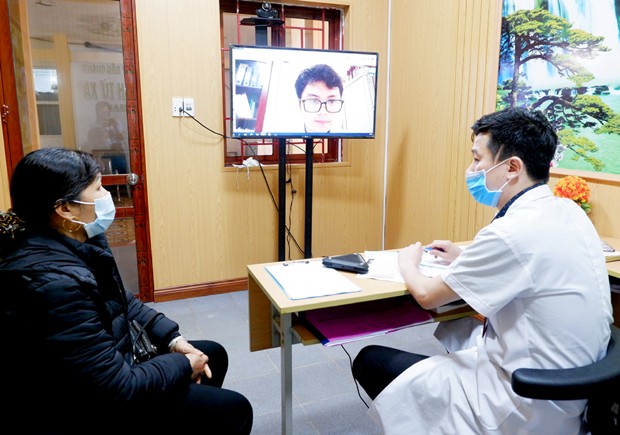
Workshop in Ha Noi: Grassroots telemedicine – Phase 2 results and future planning
Latest
 |
| Grassroots telemedicine helps patients enjoy high-quality medical services at Bac Quang General Hospital. (Photo: Ha Giang Newspaper) |
The workshop “Grassroot Telemedicine – Phase 2 Results and Future Planning”, organized by the Ministry of Health in collaboration with the United Nations Development Program (UNDP), took place on June 23 in Hanoi.
Addressing today’s workshop “Grassroot Telemedicine – Phase 2 Results and Future Planning”, Mr. Nguyen Truong Nam, Deputy Director General of the Electronic Health Administration under the Ministry of Health, said: “Based on the assessment of experts and local users, the implementation of grassroots telemedicine has had very good initial results. Local health facilities have received it positively, local people support it and participate in it effectively, and many ethnic minority people have received medical examination and treatment by grassroots doctors under the guidance and advice of doctors at a higher level, so they trust it and spread the word to many people to use this service”.
Since December 2020, UNDP has cooperated with EHA-MOH and the three provinces to develop and pilot a digital solution called “Doctor for Everyone”, including a secure video conferencing platform for multi-point calls to support professional consultations and regular meetings between district health centers, district general hospitals and commune health stations. This helps improve the quality of grassroots health service and complements the existing telehealth program connecting national hospitals with provincial and some district hospitals, which is also led by the Ministry of Health.
“The implementation of grassroots telemedicine sponsored by UNDP is completely in line with the direction of the Ministry of Health,” said Mr. Nguyen Truong Nam. “Especially in the current time when we are trying to strengthen information technology application in the health sector to improve the quality of medical examination and treatment services in the new normal period, the implementation and expansion of telemedicine services is in the right direction, not only helping people in mountainous, remote and isolated areas access quality health services in their locality through the advice of higher-level doctors, but also helping people prevent infectious diseases”.
At the workshop, UNDP Deputy Resident Representative Patrick Haverman thanked the Provincial Departments of Health of Ha Giang, Bac Kan and Lang Son provinces for their strong commitment and close collaboration with UNDP and EHA-MOH in implementing the “Doctor for Everyone” solution in all districts and communes of the three provinces.
Building on this initial success, UNDP has mobilized additional financial resources through two further projects to support MOH and provinces to scale up the grassroots telemedicine solution, thus further supporting the digital transformation in the health sector in the COVID-19 and Industrial Revolution 4.0 context. These include the project ‘COVID-19 Response for Strengthening Vaccine Access and Health System Capacity’, supported by the Government of Japan from March 2022 to March 2023, and the Korea – Viet Nam Peace Village project supported by the Government of Korea from 2022 to 2026.
“Through these projects, UNDP in close collaboration with the Ministry of Health will support replicating the “Doctor for everyone” application in Thua Thien – Hue, Quang Ngai, Binh Dinh, Ca Mau and Dak Lak provinces, with the aim to develop a nationwide grassroots telemedicine system to leave no one behind,” said Mr. Haverman. He affirmed UNDP’s readiness to deepen its strategic partnership and cooperation with the Ministry of Health, contributing to the development of the health sector in Viet Nam, with a particular focus on the healthcare system at the grassroots level.
Grassroots telemedicine solution using 4.0 technology has helped address geographical distance, enabling commune health staff in mountainous areas to seek consultation from their colleagues at the district and higher levels, thus enhancing people’s access to quality health diagnosis and treatment right at the commune health station and reducing the overloading at district and higher-level health facilities.
These are some of the key results of phase 2 of the grassroots telemedicine project, jointly implemented by UNDP and the Electronic Health Administration under the Ministry of Health (EHA-MOH) in collaboration with the Department of Health of Ha Giang, Bac Kan, and Lang Son provinces.
So far, 483 (89,5%) grassroots medical facilities have been trained and connected to provide telemedicine for people in the three provinces". According to a survey of health workers, the three most positive effects for health workers when participating in the Project are getting timely professional support at any time, saving travel time to focus on their expertise, and strengthening cohesion, exchange of information between local medical facilities.













